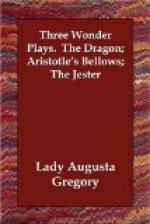1st Prince: Come on, we will help one another, and going together we’ll find, Joy with those great companions, Earth, Water, Fire, and Wind. (They join hands.)
Jester: It’s likely you’ll do great actions, for there is an ancient word, That comradeship is better than the parting of the sword, And that if ever two natures should join and grow into one, They will do more together than the world has ever done. So now I’ve ended my business, and I’ll go, for my road is long, But be sure the Jester will find you out, if ever things go wrong!
(He goes off singing.)
And so I follow after
Lycurgus who was wise;
To the little god of laughter
I pay my sacrifice!
CURTAIN
NOTES FOR THE JESTER
I was asked one Christmas by a little schoolboy to write a play that could be acted at school; and in looking for a subject my memory went back to a story I had read in childhood called “The Discontented Children,” where, though I forget its incidents, the gamekeeper’s children changed places for a while with the children of the Squire, and I thought I might write something on these lines. But my mind soon went miching as our people (and Shakespeare) would say, and broke through the English hedges into the unbounded wonder-world. Yet it did not quite run out of reach of human types, for having found some almost illegible notes, I see that at the first appearance of Manannan I had put in brackets the initials “G.B.S.” And looking now at the story of that Great Jester, in the history of the ancient gods, I see that for all his quips and mischief and “tricks and wonders,” he came when he was needed to the help of Finn and the Fianna, and gave good teaching to the boy-hero, Cuchulain; and I read also that “all the food he would use would be a vessel of sour milk or a few crab-apples. And there never was any music sweeter than the music he used to be playing.”
I have without leave borrowed a phrase from “The Candle of Vision,” written by my liberal fellow-countryman, A.E., where he says, “I felt at times as one raised from the dead, made virginal and pure, who renews exquisite intimacies with the divine companions, with Earth, Water, Air, and Fire.” And I think he will forgive me for quoting another passage now from the same book, for I think it must have been in my mind when I wrote of my Wrenboys: “The lands of Immortal Youth which flush with magic the dreams of childhood, for most sink soon below far horizons and do not again arise. For around childhood gather the wizards of the darkness and they baptize it and change its imagination of itself, as in the Arabian tales of enchantment men were changed by sorcerers who cried, ‘Be thou beast or bird.’ So ...is the imagination of life about itself changed and one will think he is a worm in the sight of Heaven, he who is but a god in exile.... What palaces they were born in, what dominions they are rightly heir to, are concealed from them as in the fairy tale the stolen prince lives obscurely among the swineherd. Yet at times men do not remember, in dreams or in the deeps of sleep, they still wear sceptre and diadem and partake of the banquet of the gods.”




